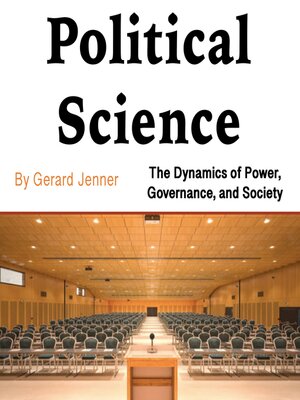Political Science
audiobook (Unabridged) ∣ The Dynamics of Power, Governance, and Society
By Gerard Jenner

Sign up to save your library
With an OverDrive account, you can save your favorite libraries for at-a-glance information about availability. Find out more about OverDrive accounts.
Find this title in Libby, the library reading app by OverDrive.



Search for a digital library with this title
Title found at these libraries:
| Library Name | Distance |
|---|---|
| Loading... |
This audiobook is narrated by a digital voice.
Political science emerges from humanity's fundamental need to understand how societies organize themselves, allocate resources, and make collective decisions that affect the lives of millions. At its core, political science grapples with questions that have puzzled philosophers and practitioners for millennia: Who should rule? How should power be exercised? What makes political authority legitimate? These enduring questions take on new urgency in contemporary societies where traditional sources of authority face challenges from technological change, globalization, and evolving social values.
The concept of political authority lies at the heart of all political systems, representing the right to make binding decisions for a community and the expectation that those decisions will be obeyed. Max Weber's influential typology of authority distinguishes between traditional authority based on custom and heredity, charismatic authority derived from exceptional personal qualities, and rational-legal authority grounded in rules and procedures. While Weber conceived these as ideal types, real political systems typically combine elements of all three, creating complex legitimacy structures that evolve over time in response to changing circumstances and challenges.
Traditional authority systems, exemplified by monarchies and tribal governance structures, derive their legitimacy from established customs and the belief that certain individuals or families possess an inherent right to rule. These systems often emphasize continuity, stability, and the preservation of established social hierarchies. However, traditional authority faces significant challenges in modern societies where education, social mobility, and democratic ideals create expectations for broader participation in governance and question the hereditary basis of political power.







